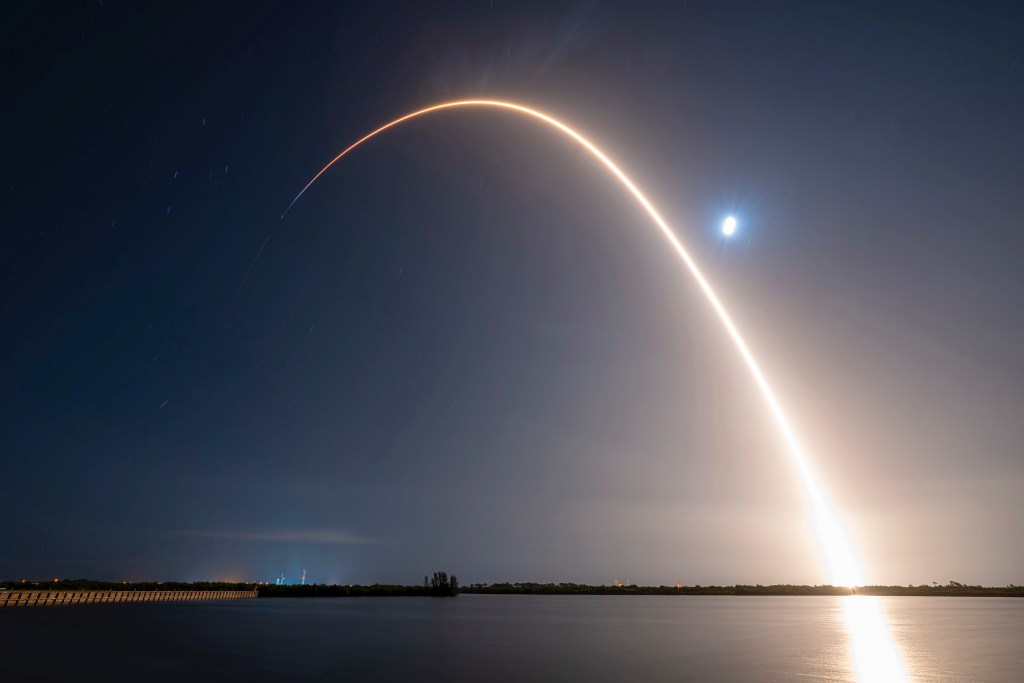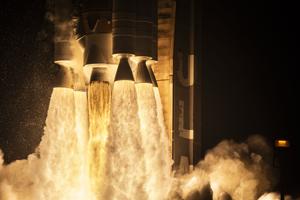Science
SpaceX Launches Amazon’s Project Kuiper Satellites into Orbit

On July 16, 2023, SpaceX successfully launched a batch of satellites for Amazon’s Project Kuiper, marking a significant step in the competition for satellite broadband services. The mission employed a Falcon 9 rocket, which lifted off from Cape Canaveral Space Force Station in Florida. This launch is part of Amazon’s initiative to establish a constellation of satellites aimed at providing high-speed internet access to underserved areas globally.
Details of the Launch
The Falcon 9 rocket carried a payload of 13 satellites, contributing to the growing Project Kuiper constellation, which is intended to enhance broadband connectivity worldwide. With this launch, Amazon aims to deploy a total of 3,236 satellites in low Earth orbit, facilitating internet access in remote regions where traditional broadband options are limited.
SpaceX’s role in this launch highlights its position as a key player in the aerospace industry, providing launch services not only for its own missions but also for competitors like Amazon. This partnership underscores the evolving landscape of satellite communications, where collaboration among companies can accelerate technological advancements.
Implications for the Satellite Broadband Market
As satellite broadband becomes increasingly critical for global connectivity, the stakes are high. Amazon’s Project Kuiper competes directly with other initiatives, notably Starlink from SpaceX, which has already launched thousands of satellites to provide internet access. The emergence of multiple players in this field promises to enhance competition, potentially lowering costs and improving service quality for consumers.
The successful launch on July 16 is a testament to the capabilities of SpaceX, which has built a reputation for reliability in launching payloads into orbit. Amazon’s investment in this technology also signals its commitment to expanding its reach in the broadband market, aiming to connect millions who currently lack adequate internet access.
Both companies are navigating a landscape filled with regulatory challenges and technological hurdles, yet the potential benefits of improved internet access are substantial. As more satellites are deployed, users in remote and underserved areas can expect to see a significant improvement in their connectivity options over the coming years.
With the satellite broadband sector poised for growth, the success of initiatives like Project Kuiper will be closely monitored by industry experts and consumers alike. The July launch represents just one of many steps Amazon will take as it seeks to carve out its place in this competitive market.
-

 Technology5 months ago
Technology5 months agoDiscover the Top 10 Calorie Counting Apps of 2025
-

 Technology2 weeks ago
Technology2 weeks agoOpenAI to Implement Age Verification for ChatGPT by December 2025
-

 Health3 months ago
Health3 months agoBella Hadid Shares Health Update After Treatment for Lyme Disease
-

 Health3 months ago
Health3 months agoErin Bates Shares Recovery Update Following Sepsis Complications
-

 Health3 months ago
Health3 months agoAnalysts Project Stronger Growth for Apple’s iPhone 17 Lineup
-

 Technology5 months ago
Technology5 months agoDiscover How to Reverse Image Search Using ChatGPT Effortlessly
-

 Technology3 months ago
Technology3 months agoElectric Moto Influencer Surronster Arrested in Tijuana
-

 Technology2 months ago
Technology2 months agoDiscover 2025’s Top GPUs for Exceptional 4K Gaming Performance
-

 Technology5 months ago
Technology5 months agoMeta Initiates $60B AI Data Center Expansion, Starting in Ohio
-

 Technology5 months ago
Technology5 months agoRecovering a Suspended TikTok Account: A Step-by-Step Guide
-

 Health5 months ago
Health5 months agoTested: Rab Firewall Mountain Jacket Survives Harsh Conditions
-

 Lifestyle5 months ago
Lifestyle5 months agoBelton Family Reunites After Daughter Survives Hill Country Floods





















